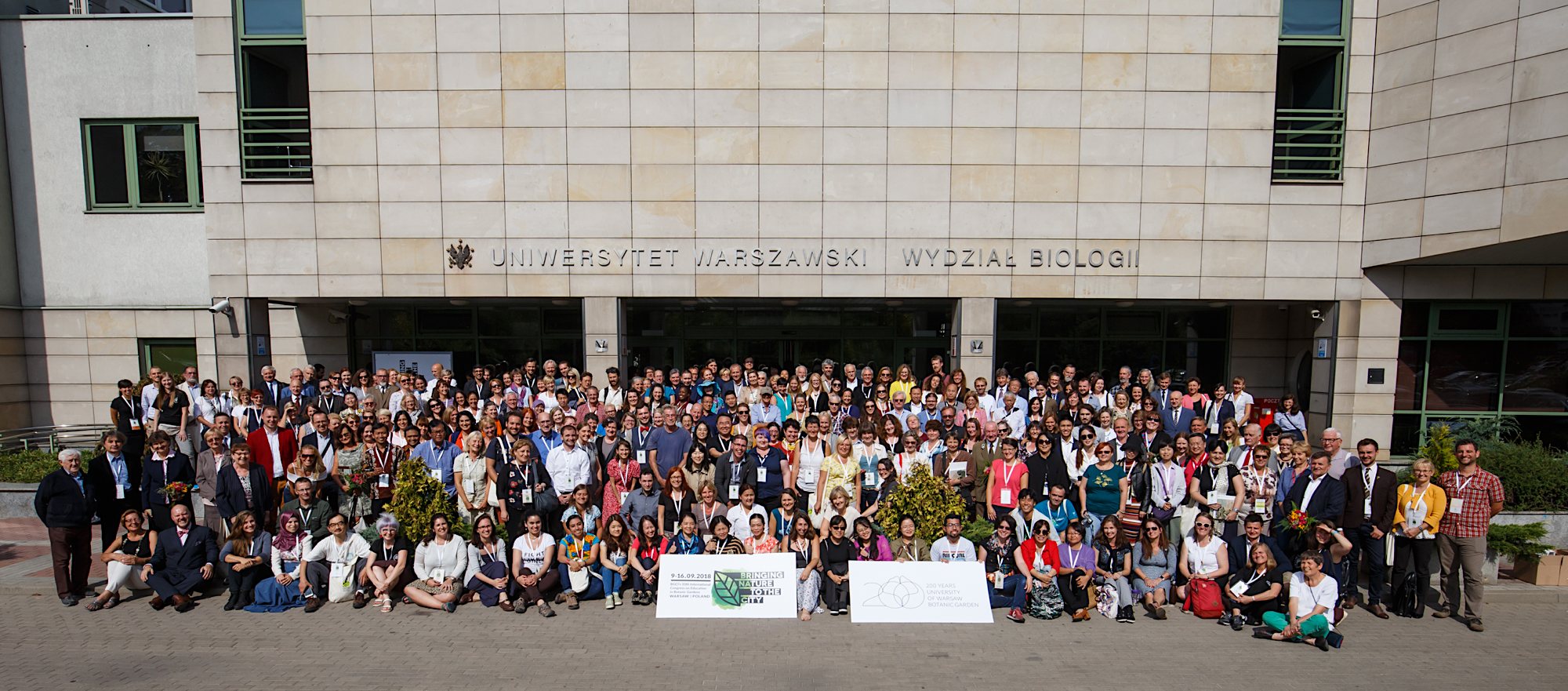10th International Congress on Education in Botanic Gardens Resources
The 10th International Congress on Education in Botanic Gardens took place on 10th – 14th September 2018 at the University of Warsaw Botanic Garden. The theme of the Congress was “Bringing nature to the city. Celebrating the 200th anniversary of the University of Warsaw Botanic Garden” and almost 300 delegates from around the world attended the event.

Congress themes
- City Gardens – City gardens all over the world have much in common. What do they offer to their audiences? What kind of difficulties do they face, what is specific for such gardens and how do they answer the challenges and advantages of their location in educational programmes?
- New Educational Tools – This session is dedicated to practical tools and solutions used in education in botanic gardens – from inexpensive homemade tools to more sophisticated technologies used in education and its evaluation. Presentations should be focused on the design of the tools which might be copied in other gardens
- Working Together – Challenges can often arise from the presence of and interaction between different groups of employees within the garden (gardeners, curators, educators, etc.) who may have different backgrounds, perspectives and priorities for their work. This session is dedicated to sharing good practice on developing cooperation and problem solving, with the aim of realizing a garden’s mission and ensuring the support and involvement of staff of the garden within educational initiatives. In addition this session will also look at how gardens work outside of their own organisation, building networks to support their work. Botanic gardens have great potential for linking people and organizations – acting as important hubs in the vicinity but there are important challenges that need to be addressed to successfully achieve this.
- Supporting Formal Education – How do botanic gardens work with partners that represent formal education systems (schools, teachers etc.)? Do they influence curricula and governmental educational polices? This session is focused on nature based tools, methods, inspirations and innovations in the field of formal education.
- Reaching New Audiences – This session focuses on the importance of reaching new audiences and will share case studies of projects that aimed to develop relationships with new audiences, discussing successes and lessons learnt. This will include new and creative ways of working with new audiences, effective ways to reach audiences and important lessons from less successful projects. This session will also look at why some audiences are harder to reach for the botanic garden sector.
- Measuring impact – Objective 4 of the Global Strategy for Plant Conservation asks that “Education and awareness of plant diversity, its role in sustainable livelihoods and importance to all life on earth is promoted”. The education and public engagement work of botanic gardens should aim to address this objective as well as the Aichi biodiversity targets (specifically target 1) and the Sustainable Development Goals (primarily 4, 11, 12, 13 and 15). But how do we know if we are meeting these aims, what is the impact of the education work that is being delivered and how is this contributing to key issues such as sustainability, climate change and biodiversity conservation? This session will explore the work of educators to address these targets and focus on the ways in which impact can be measured.
- Education in Polish Botanic Gardens – The session is dedicated to the challenges Polish botanic gardens face in their educational activity. The session will be held in Polish.
- Celebrating the 200th anniversary of the University of Warsaw Botanic Garden – A special session to celebrate 200 anniversary of University of Warsaw Botanic Garden will also be held during the Congress.
Associated resources
10th International Congress on Education in Botanic Gardens programme
ICEBG10 Plenary: Marianne Krasny - Education in city gardens
ICEBG10 Plenary: Paul Smith – Growing public engagement impact
ICEBG10 Plenary: Nico Wissing - A designer's perspective
ICEBG10 Plenary: Richard Deverell - Kew in the 21st Century
ICEBG10 Plenary: Chris Thorogood - Animating the inanimate
ICEBG10 Plenary: Krzysztof Spalik - Formal learning in botanic gardens
ICEBG10 Plenary: Sue Wagner - Assessing social impact
ICEBG10 Plenary: Ilona Tanska - Impact: Measuring learning
ICEBG10 Plenary: Flis Plent - Watch & learn
ICEBG10 Plenary: Ari Novy - Intentional practice and evaluation
ICEBG10 Plenary: Wanlu Liu - School green space and environmental educational programmes
ICEBG10 Plenary: Ian Edwards - How to reach new audiences and why this matters
ICEBG10 Plenary: Liliana Derewnicka - The BigPicnic project
Share





